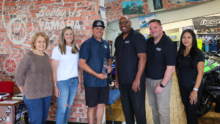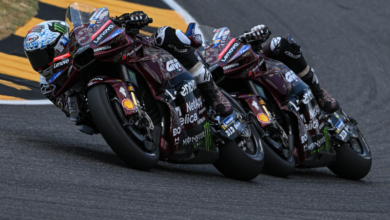Jan. 20, 2003 – Finance Digest
Bombardier faces tough year in 2003; major changes are possible
By all accounts, Bombardier Inc., Montreal, Quebec, is looking at major changes in this new year as it adjusts to a new president, Paul Tellier, the former hard nosed chief executive of Canadian National Railway Co. (CN).
Tellier took over as the transportation giant’s new chief executive Jan. 13. He replaced Robert F. Brown, who was abruptly dismissed as president and CEO on Dec. 12, 2002.
Tellier, 63, is familiar with the Bombardier situation, since he has been a director of the company since 1997. But he’s mum about possible changes, and has declined to give interviews.
However, based on his reputation at Canadian National Railway Co., Tellier is expected to waste no time in making changes, and they could include major job cuts across the board.
These changes also could include the sale of the recreational products division, according to published reports. The division is a major employer in Canada and the northern U.S.
However, this move doesn’t seem likely, according to industry observers and Bombardier employees, since the division includes the Ski-Doo snowmobile operation on which the company was founded by J. Armand Bombardier in 1942. Plus, the majority of the company’s voting stock is held by the Bombardier family which has four members on the board of directors.
A representative of the Bombardier Recreational Products division said: “We categorically deny that (sales) rumor. There’s no foundation to that rumor whatsoever.”
Last year was not a good year for Bombardier. It’s been hurt especially by a slowdown in the private aircraft industry following the attacks of 9/11.
And, after years of growth, Bombardier stock slumped last year and Brown was given his walking papers last December, when shares fell to about $3.00 (Canadian) from a 52-week high of about $17 (Canadian).
Tellier, who rides a BMW motorcycle, said at the time of his appointment, “There is no way that the shareholders can accept the current performance.”
Tellier gets results
It’s too early to tell what might happen at Bombardier, but Tellier has been an aggressive cost-cutter in previous situations.
Tellier is best known for taking over the failing Canadian National Railway in 1992 and transforming it into one of North America’s most efficient railroad companies. Its shares have multiplied in value several times since CN was privatized by the federal government in 1985.
“At Canadian National, he cut thousands of jobs, sold nonrailroad businesses and introduced tight schedules,” notes a New York Times report.
CN has 20,000 fewer workers, 800 fewer locomotives and 22,000 fewer freight cars than it did a decade ago, reports the Times, but it hauls more freight and is more profitable.
Big changes could come soon, says Douglas Young, who worked with Tellier. “I don’t think Paul will dilly-dally,” the former Canadian transportation minister told the New York Times.
Honda Invests in Thailand
Japan’s Honda Motor Co. plans to invest about $30 million in Thailand this year to expand research and development (R&D) for motorcycles and provide training, something Asian Honda Motor Co. President Satoshi Toshida reportedly described as a bid to boost the company’s business in Southeast Asia.
Honda’s motorcycle sales in Thailand are projected to reach 1.27 million units for 2003, a 27% rise from the previous year, while sales for 2004 are forecast at 1.3 million units. Toshida, told a press conference in Bangkok that the total investment slated for 2004 will cover $21.7 million to expand R&D operations for motorcycles and $8.12 million to build a technical training center.
“Motorcycle sales in ASEAN (Association of Southeast Asian Nations) are expected to reach a record of 3.5 million units (in 2003) with Indonesia, the Philippines, Thailand and Vietnam recording new highs,” Toshida said. “We expect to reach 3.8 million units (in 2004).”
The Association of Southeast Asian Nations (ASEAN) was formed in 1967 by Indonesia, Malaysia, the Philippines, Singapore, and Thailand to promote political and economic cooperation and regional stability. Since then, Brunei, Vietnam, Laos, Burma and Cambodia were admitted into full membership.
Yamaha Plans Expansion in China
Japan-based Yamaha Motor Co. reportedly plans to establish a new sales subsidiary for motorcycles in China; a firm designed to unify the sales activities of three affiliate companies with the goal of increasing the manufacturer’s share in the burgeoning market.
Yamaha’s three joint ventures in China are operated jointly with the Chinese government, carry out their own market research and product planning, and manufacture and sell their new vehicles separately.
Yamaha says that setup makes it difficult to plan strategy, and says the new company — to be founded in 2004 at the earliest if the Chinese government approves the project — would become the sole distributor of Yamaha motorbikes in China.
Yamaha Motor posted a record high net profit of $179 million for the first half of the fiscal 2003/2004 (beginning April 2003), up 67.1% from the same period in the previous year, due partly to strong sales of motorcycles in Asia.
Triumph Goal: 70,000 Units
British manufacturer Triumph Motorcycles is eyeing the possibility of doubling its sales and production to at least 70,000 units a year during the next five years.
“I will be disappointed if Triumph does not increase its sales and production by 25% a year over each of the next five years,” Tue Mantoni, who recently became Triumph’s commercial director, told The Financial Times newspaper.
United Plans Single-brand Operation
United Trailers, which also markets trailers under the Southwest Trailers brand, says it plans to consolidate its product lines of enclosed cargo, concession, racecar and ATV trailers under one brand identification.
Formerly operated as United Expressline, Inc., United Trailers produces product at facilities in Bristol and Elkhart, Ind., while Southwest Trailers have been built in Mottville, Mich. All three manufacturing facilities will continue to operate, but produce only United Trailers brand product.
“We want to place all of our efforts behind the United Trailer identification and unite the strengths of our combined dealer groups, our facilities and our people,” said Gary Stanley, president of United Trailers.
Will Royal Dutch shares rebound?
Shares of oil group Royal Dutch Petroleum Co. could be poised for a rebound this year due to the company’s strong balance sheet, high dividend, and relative insulation from oil price swings, Barron’s newspaper said in its Jan. 6 issue.
Royal Dutch’s stock price was beaten down in 2002 after the company was dropped from the Standard & Poor’s 500 index , and trades at a discount to industry leader ExxonMobil Corp., Barron’s said.
Cost cuts within the company, as well as a possible improvement in the economy, could also help boost Royal Dutch’s earnings and share price.
The company’s American Depositary Receipts closed at $44.78 Jan. 3, 2003, on the New York Stock Exchange.
ArvinMeritor completes purchase
ArvinMeritor, Inc. (NYSE:ARM), Troy, Mich., has agreed to acquire the remaining 51% interest in its German joint venture, Zeuna Starker GmbH & Co. KG, a $600 million exhaust and emissions solutions company. The purchase price is approximately $75 million, and the transaction is expected to close in the second quarter of fiscal year 2003.
ArvinMeritor will incorporate Zeuna Starker into its Light Vehicle Systems’ (LVS) Air and Emissions Technologies (A&ET) product group, effective Jan. 1, 2003. Michael Bleidt, former Zeuna Starker executive vice president of sales and engineering, has been named to lead the A&ET product group as its vice president and general manager. Bleidt will report to LVS’ President Craig Stinson.
“Integrating Zeuna Starker into ArvinMeritor’s A&ET business creates a complete range of emissions solutions for our global automotive customers,” said Stinson. ArvinMeritor became a 49% partner in the Zeuna Starker joint venture in 1998.
ArvinMeritor, Inc. is a $7 billion global supplier of a broad range of integrated systems, modules and components to the motor vehicle industry.
Jordan quits Oakley
Basketball legend Michael Jordan has resigned his position on the board of directors at Oakley, Inc. (NYSE:OO), but will serve as a special adviser to the board and continue to endorse Oakley’s eyewear products.
Jordan’s position on the board has been filled by advertising executive Lee Clow, who is chairman and worldwide creative director of TBWA and TBWA/Chiat/Day.
Clow has more than 30 years of advertising agency experience and is a member of the One Club Hall of Fame, the Art Directors Hall of Fame and the Museum of Modern Art’s Advertising Hall of Fame.
Clow joined Chiat/Day in 1972 and helped fuel its growth into one of the 10 largest agencies in the world today with more than 220 offices in 72 countries.
TBWA/Chiat/Day was voted 1997 Agency of the Year by USA Today, Adweek, Advertising Age, Shoot Magazine and Advertising Age’s Creativity, and has won numerous industry awards for its outstanding, often ground-breaking advertising campaigns.
“With my current involvement in more than 20 organizations and charities,” said Jordan, “I am concerned that I may not have the amount of time necessary to hold an Oakley board position.”
APS gets financing for purchases
America’s PowerSports (APS), a leading national power sports dealer group based in Nashville, Tenn., has closed on a $13 million round of venture capital. River Cities Capital Funds led the round, and was joined by new investors, including Aavin Equity Partners, as well as existing investors, including Wind Point Partners and Alpha Capital.
The funds will be used to accelerate the company’s program of acquiring and managing retail dealerships selling motorcycles, ATVs and personal watercraft.
Formed in November 1998, America’s PowerSports is one of the nation’s largest retail power sports dealer networks, and represents all major brands including Harley-Davidson, Honda, BMW, Yamaha, Suzuki, Kawasaki, Sea-Doo and Polaris and has nine dealership locations with 28 brands in three states. More information may be found on the company’s Web site at www.americaspowersports.com.
River Cities manages $300 million in venture capital. The funds are concentrated on investments in the Midwest and Southeast, with offices in Cincinnati and Raleigh. The Funds’ nine portfolio managers focus on middle and late stage companies in sectors including outsourced business services, healthcare services, retail/consumer and telecommunications.
“This business has a lot of resilience and growth potential, and River Cities Capital Funds and their co-investors share the same vision that we do,” said Clark Vitulli, president and CEO of America’s PowerSports. “In addition to their investment, they bring a level of expertise to the team that is fundamental to the continued development of the company.”
Murray Wilson, a director of River Cities Capital Funds in Cincinnati, Ohio, said the APS management team “has successfully demonstrated their ability to improve the operations and profitability of the dealerships they acquire. Their focus on improved customer satisfaction, service and operations provide a solid foundation for growth.”
UTI Stock Begins Trading
Universal Technical Institute, Inc., Phoenix, Ariz., says its initial public offering of 7,500,000 shares of common stock, priced at $20.50 per share, is listed on the New York Stock Exchange under the symbol UTI and began trading Dec. 17.
UTI provides technical education training in automotive, diesel, collision repair and refinishing, motorcycle, marine and personal watercraft technologies.
The deal includes the sale of 3,250,000 UTI-held shares and 4,250,000 shares from stockholders agreeing to sell. UTI will not receive any of the proceeds from the shares of common stock sold by the selling stockholders. The company says it intends to use net proceeds from the offering to repay outstanding indebtedness, to pay all accrued dividends on and redeem a portion of the shares of the outstanding preferred stock, and for general corporate purposes.
UTI was recapitalized by New York-based equity sponsor The Jordan Company, L.P. in 1998 in partnership with its senior management. In addition to the 1998 recapitalization, Jordan assisted UTI with the simultaneous acquisition and merger of Motorcycle Mechanics Institute and Marine Mechanics Institute.
In 2002, UTI completed a private placement of equity securities representing a minority interest in the company to a group of investors led by affiliates of Penske Capital Partners and Charlesbank Capital Partners.
Providing technical education for over 35 years, UTI offers undergraduate degrees, diplomas and certificate programs at seven campuses across the United States, and manufacturer-sponsored advanced programs at 22 dedicated training centers. For the 12 months ended Sept. 30, 2003, the company’s average undergraduate enrollments were 10,568 full-time students.





